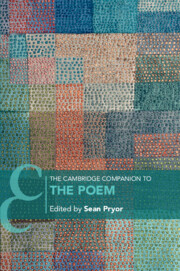Book contents
- The Cambridge Companion to the Poem
- The Cambridge Companion to the Poem
- Copyright page
- Contents
- Figures
- Contributors
- Acknowledgments
- Chronology
- Introduction
- Part I Ideas of the Poem
- Part II Forms of the Poem
- 7 Voice
- 8 Rhythm
- 9 Image
- 10 Sound
- 11 Diction
- 12 Style
- Part III The Poem in the World
- Further Reading
- Index
- Cambridge Companions To …
8 - Rhythm
from Part II - Forms of the Poem
Published online by Cambridge University Press: 30 May 2024
- The Cambridge Companion to the Poem
- The Cambridge Companion to the Poem
- Copyright page
- Contents
- Figures
- Contributors
- Acknowledgments
- Chronology
- Introduction
- Part I Ideas of the Poem
- Part II Forms of the Poem
- 7 Voice
- 8 Rhythm
- 9 Image
- 10 Sound
- 11 Diction
- 12 Style
- Part III The Poem in the World
- Further Reading
- Index
- Cambridge Companions To …
Summary
Introducing the concept of verse history and adapting Roman Jakobson's distinction between verse design and verse instance, this chapter considers a sequence of brief case studies drawn from the work of multiple writers: the Beowulf poet, William Langland, the Gawain poet, John Gower, Wallace Stevens, Elizabeth Willis, Victoria Chang, and André 3000. The chapter proposes that, even after free verse, reading poetry historically still must involve a consideration of the relationship of rhythm to meter. The potential for friction between verse instance and verse design, and more broadly between poems and poetry, implies a need for relations of supplementarity. Moments of rhythmical disturbance disclose how what one had located outside the lone poem – a metrical template, a political ideal, or a historical event – comes rushing into it and through it.
- Type
- Chapter
- Information
- The Cambridge Companion to the Poem , pp. 133 - 148Publisher: Cambridge University PressPrint publication year: 2024

